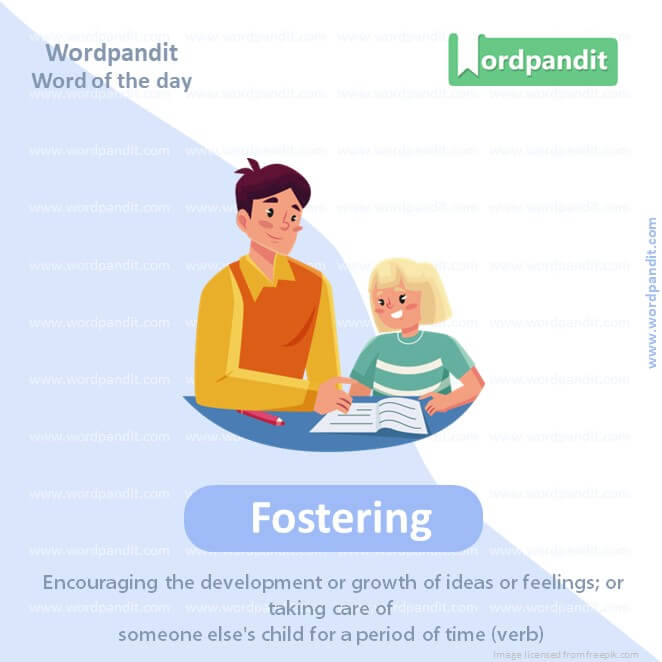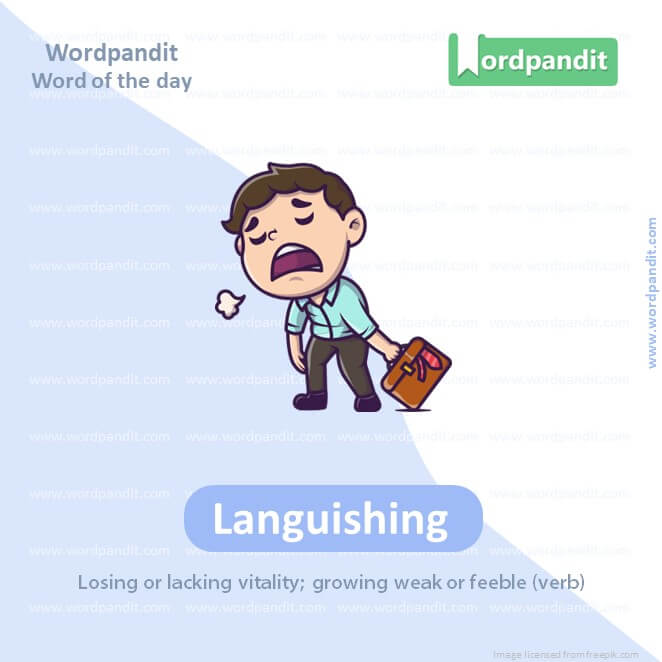Daily Vocabulary Words: List of Daily Used Words in Leading Indian Newspapers
Hi there. Welcome to this special section @ Wordpandit. Our endeavour here is straightforward: highlighting daily vocabulary words that you would come across in leading newspapers in the country. We have included the following newspapers in our selection:
• The Times of India
• The Economic Times
• Hindustan Times
• Mint
• Indian Express
We are putting in extensive work to develop your vocabulary. All you have to do is be regular with this section and check out this post daily. This is your repository of commonly used words; essentially, we are posting a list of daily used words. Hence, this has significant practical application as it teaches you words that are commonly used in leading publications mentioned above.
Visit the website daily to learn words from leading Indian newspapers.

WORD-1: Determinant
CONTEXT: which are a key determinant of accessing better quality jobs. At the same time, youth’s aspirations are evolving, which needs to be matched with the type of employment available in the labour market.
SOURCE: Hindustan times
EXPLANATORY PARAGRAPH: A determinant is like a big clue that helps you figure out something important, like solving a puzzle. It’s a piece of information that helps make a decision or understand how things work.
MEANING: A factor that decisively affects the nature or outcome of
something
PRONUNCIATION: dih-TUR-muh-nuhnt
SYNONYMS: factor, element, cause, influence, consideration
USAGE EXAMPLE:
1. Weather is often a determinant of outdoor activities.
2. The availability of resources is a key determinant in project planning.
3. Economic factors are important determinants of market trends.
4. Social attitudes can be determinants of behavior.
WORD-2: Diversification
CONTEXT: The rate of employment diversification, access to regular jobs and shift towards medium/high-skill jobs was higher among the youth though the shift towards skilled jobs did not fully meet the growing demand for such jobs.
SOURCE: Hindustan times
EXPLANATORY PARAGRAPH: Diversification is like having different options or choices instead of just one. It’s like having a variety of toys to play with instead of only one type.
MEANING: The process of adding variety or different types of things to something to make it more diverse or varied (noun).
PRONUNCIATION: dih-VUR-suh-fih-KAY-shuhn
SYNONYMS: variety, assortment, range, mix, multiplicity
USAGE EXAMPLE:
1. The company’s strategy includes diversification into new markets.
2. Diversification of investments reduces risk.
3. Diversification of skills can lead to more opportunities.
4. The ecosystem benefits from the diversification of plant and animal species.

WORD-3: Fostering
CONTEXT: The Make in India and Production Linked Incentive schemes can play a critical role in making India a manufacturing hub, thus inserting the country into global value chains and fostering industrial growth, which will support the creation of jobs for young people.
SOURCE: Hindustan times
EXPLANATORY PARAGRAPH: Fostering is like taking care of something or helping it grow, like when you nurture a plant by watering it and giving it sunlight.
MEANING: Encouraging the development or growth of ideas or feelings; or taking care of someone else’s child for a period of time (verb)
PRONUNCIATION: FAH-ster-ing
SYNONYMS: nurturing, cultivating, promoting, encouraging, supporting
USAGE EXAMPLE:
1. The organization is dedicated to fostering innovation among its employees.
2. Parents play a crucial role in fostering the emotional development of children.
3. The program focuses on fostering creativity and critical thinking.
4. Teachers play an important role in fostering a love for learning.

WORD-4: Apprenticeship
CONTEXT: the next-generation skills and apprenticeship eco-system needs to be based on a stronger partnership with the private sector.
SOURCE: Hindustan times
EXPLANATORY PARAGRAPH: Apprenticeship is like learning something new by working closely with someone who already knows how to do it, like when you learn how to cook by helping your mom or dad in the kitchen.
MEANING: A period of time spent learning a trade or skill from a skilled worker
(noun)
PRONUNCIATION: uh-PREN-tiss-ship
SYNONYMS: training, internship, mentorship, tutelage, apprenticeship program
USAGE EXAMPLE:
1. He completed his apprenticeship and became a certified electrician.
2. The apprenticeship program offers hands-on experience in the industry.
3. She started her career with an apprenticeship at a local bakery.
4. The company values apprenticeship as a way to pass on skills and knowledge.

WORD-5: Enhancement
CONTEXT: I examine runners coming to me either for performance enhancement or to treat running injuries, their ankles and hips are extremely stiff.
SOURCE: Hindustan times
EXPLANATORY PARAGRAPH: Enhancement is like making something better or improving it, like adding extra toppings to your pizza to make it tastier.
MEANING: Improvement or enhancement in quality or value (noun).
PRONUNCIATION: en-HANSS-muhnt
SYNONYMS: improvement, enhancement, upgrade, enrichment, refinement
USAGE EXAMPLE:
1. The new software update includes several enhancements to user experience.
2. Education is seen as an enhancement to one’s career prospects.
3. The garden underwent enhancements with new plants and features.
4. The artist made enhancements to the painting to highlight its beauty.
WORD-6: Tendons
CONTEXT: You need muscles, tendons and ligaments to get you going.
SOURCE: Hindustan times
EXPLANATORY PARAGRAPH: Tendons are like strong ropes in your body that connect your muscles to your bones. They help you move by transferring the power from your muscles to your bones.
MEANING: Tough bands of fibrous tissue that connect muscles to bones and facilitate movement (noun).
PRONUNCIATION: TEN-dunz
SYNONYMS: sinews, ligaments, connective tissues, cables, cords
USAGE EXAMPLE:
1. The doctor explained how the tendons in the hand allow for gripping and grasping.
2. He injured his tendons while playing sports and needed physical therapy.
3. Tendons play a crucial role in the movement of joints.
4. Athletes often focus on strengthening their tendons to prevent injuries.
WORD-7: Emphasising
CONTEXT: You need to start focusing on mobility and strength training. Notice that I am not emphasising stretching as in India we go overboard with stretching till cats, dogs and even bulls come back home.
SOURCE: Hindustan times
EXPLANATORY PARAGRAPH: Emphasizing is like highlighting something to show its importance, like when you use a bright color to make a word stand out in your drawing.
MEANING: Giving special importance or attention to something, highlighting its significance (verb).
PRONUNCIATION: EM-fuh-sahy-zing
SYNONYMS: highlighting, stressing, underscoring, accentuating, spotlighting
USAGE EXAMPLE:
1. The speaker was emphasizing the importance of teamwork in achieving success.
2. She emphasized the need for environmental conservation in her speech.
3. The teacher used gestures to emphasize key points during the lecture.
4. The report emphasizes the impact of climate change on coastal regions.

WORD-8: Languishing
CONTEXT: the National Police Commission when he wrote two articles in the Indian Express in January 1979, about the languishing of undertrials in the prisons of Bihar, many of whom well beyond the maximum sentence that they would have got if they had been convicted for the offences they were charged with.
SOURCE: Hindustan times
EXPLANATORY PARAGRAPH: Languishing is like feeling a bit sad or bored for a long time, like when you’re waiting for something exciting to happen but it’s taking too long.
MEANING: Losing or lacking vitality; growing weak or feeble (verb)
PRONUNCIATION: LANG-gwih-shing
SYNONYMS: moping, wallowing, pining, despondent, listless
USAGE EXAMPLE:
1. The plant was languishing in the corner due to lack of sunlight.
2. He was languishing in his job and wanted a change.
3. The novel’s protagonist spent years languishing in prison.
4. The team’s performance was languishing until they got a new coach.
WORD-9: Ingenious
CONTEXT: the release of more than 40,000 undertrials across the country, and opened the floodgates to the ingenious judicial innovation called PILs.
SOURCE: Hindustan times
EXPLANATORY PARAGRAPH: Ingenious is like being really clever or smart in a creative way, like when you come up with a cool invention using your imagination.
MEANING: Clever, inventive, and creative, especially in solving problems or creating new things (adjective).
PRONUNCIATION: in-JEE-nee-uhs
SYNONYMS: creative, innovative, resourceful, inventive, brilliant
USAGE EXAMPLE:
1. The engineer came up with an ingenious solution to the problem.
2. Her ingenious design won first prize in the competition.
3. The artist’s paintings are admired for their ingenious use of colors.
4. The inventor’s ingenious device revolutionized the industry.
WORD-10: Feuding
CONTEXT: Carter had yet to get the Nobel Peace Prize, and Desai had not yet received either the Bharat Ratna or the Nishan-e-Pakistan (the highest civilian honours of India and Pakistan respectively), both men were known as leaders who brought feuding factions and nations to the table.
SOURCE: Hindustan times
EXPLANATORY PARAGRAPH: Feuding is like when two groups of people or families are always arguing or fighting with each other, often over something that happened in the past.
MEANING: Engaged in a prolonged and bitter quarrel or dispute (adjective).
PRONUNCIATION: FYOO-ding
SYNONYMS: quarreling, fighting, arguing, bickering, clashing
USAGE EXAMPLE:
1. The feuding families refused to speak to each other for years.
2. The feuding neighbors argued over property boundaries.
3. The feuding tribes had a long history of conflict.
4. The feuding siblings couldn’t agree on how to divide their inheritance.
Vocabulary list
In navigating the seas of language learning, a ‘vocabulary list’ can often be a dependable guiding star. These collections of words serve as a focused learning tool, yet the technique of mastering a ‘vocabulary list’ effectively requires more than simple perusal. It calls for a smart, sustained approach that amalgamates understanding, memory, and application.
Exploring a ‘vocabulary list’ should be more than a one-way trip. It ought to be more like a round trip, wherein you learn the words, come back to review them, and then set out again for a new voyage. This repeated interactive way of exploring the ‘vocabulary list’ aids in solid memory retention and effective learning.
Next, while dealing with a ‘vocabulary list’, employing memory-boosting techniques can bolster your retention substantially. Here, mechanisms like spaced repetition systems and flashcards can simplify and streamline the process. Moreover, associating words on your ‘vocabulary list’ with visual cues or personal stories can help your brain make strong connections, strengthening your recall ability.
However, the most crucial aspect of learning from a ‘vocabulary list’ is active application. Conquering a list without using the words in real-world contexts might leave you with fleeting knowledge. Hence, make it a point to integrate these learnt words into your daily interactions, be it on social media, in email exchanges, or casual conversations. The regular utilization reinforces your understanding and brings the ‘vocabulary list’ to life.
Conclusively, the ‘vocabulary list’ is a treasure trove in a language learner’s quest, waiting to be unlocked strategically. Through the trinity of review, memory-enhancing techniques, and active application, one can master any ‘vocabulary list’. So, take charge of your learning journey and set sail with your ‘vocabulary list’, charting the vast and fascinating seas of language.










